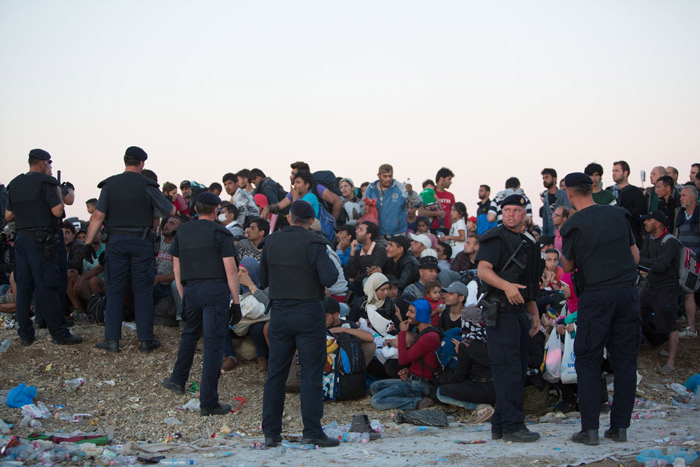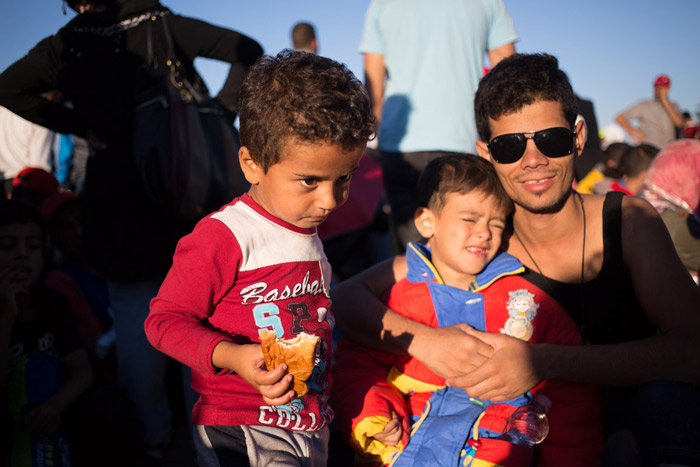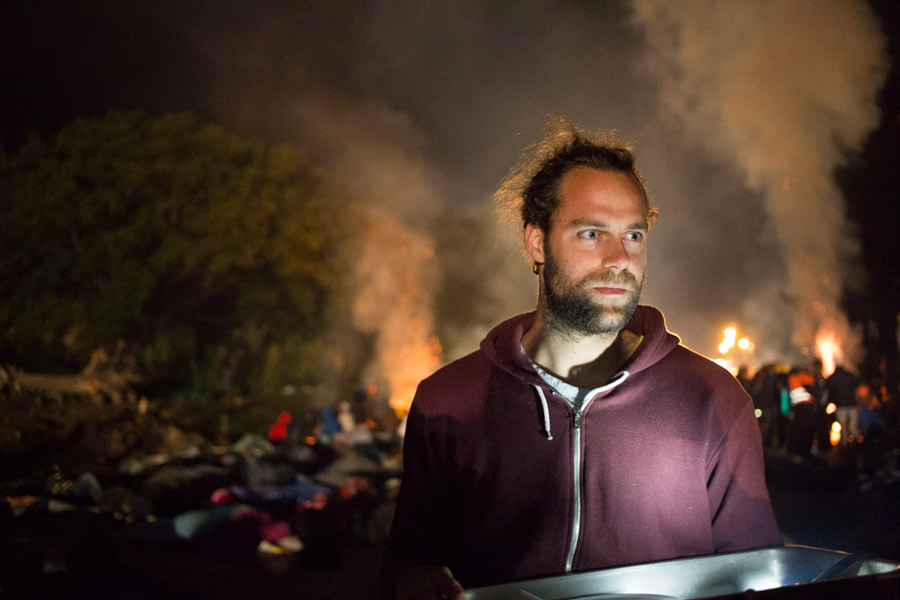Igor Kubát fled from the war in Yugoslavia to Sweden. Today, he is working as a volunteer at the border between Serbia and Croatia.
On the outskirts of the Serbian border city Sid in the western parts of the country, bus after bus arrives, filled with refugees. On a path that passes through corn fields, children, adults, and elderly people then walk the last few metres to the European flag. According to an on-site Swedish volunteer-worker, over 30,000 people have passed through here, oftentimes several thousand in a day.
Igor Kubát is working his ninth day as a volunteer, and he knows the drill. He speaks to other volunteers at the scene to get a full picture of how the land lies, before his own group of volunteers decide to send a car off to buy water and food supplies.
“A few weeks ago, I started a Facebook-page which I spread to my friends and, in that way, managed to raise 10,000 SEK through Swish, and then I paid for the trip down here with money I had planned to use for an around-the-world voyage.”
This is not the first time Igor Kubát finds himself in Serbia. He was born in a Hungarian-speaking town in the country, but fled to Sweden only three years old together with his parents, due to the Yugoslavian war.

Igor Kubát tells me about a secure upbringing with lots of friends, but he is most thankful for the healthcare that saved his brothers.
“I had the best upbringing in the world, living in Sweden. At the same time, my brothers would not have survived if they had stayed in Serbia, because they were born three months prematurely. That is why I want to give something back.”
This autumn, Igor Kubát will receive a Bachelor’s degree in Human Rights Studies at Lund University. He is driven by the desire to help others. And at the scene by the border, a lot of help is needed, both from him and other volunteers.
The sun is beating down, but after a few minutes’ walk, the long-expected EU-sign comes into vision, just next to a semi-derelict cemetery. A family accepts a bottle of water before wandering on, taking a queue ticket and waiting for a bus that will take them to a refugee camp in the Croatian city Tovarnik. But neither volunteers, nor journalists are admitted entrance to the no man’s land where several thousand refugees are waiting for buses to take them away, but are instead banished to stay on Serbian soil.
In the long queue, stretching for about a kilometre, in spite of screaming children and frustrated people, glimpses of laughter and smiles can be seen surprisingly often. People are curious and are asking questions. Someone treats others to cigarettes, someone else shares their water. Many of the refugees harbour harsh experiences. Several of them describe the Macedonian police as violent and the journey by boat across the Mediterranean Sea as being very hazardous. But for Igor Kubát, the closing of the Hungarian border in Röszeke made the deepest impression.
“In Hungary, the police were the biggest problem. We got no answers, despite the fact that I speak fluent Hungarian. We did not know what would happen. If the refugees would be registered or not. It was very tense.”

At the scene were Igor Kubát and nine other volunteers, and they were completely alone, bar only journalists. The police had closed the border three hours earlier than what had been announced. But together, the volunteers were able to convince the police to open the border, and keep it open until the decided time had come. In that way, another one thousand refugees were able to pass the border, but after that, the border remained closed, even though refugees were still arriving at the border. On that day, a woman had hurried to make it over the border, but she fainted and the belly broke the fall.
“She was pregnant and afraid of having a miscarriage. She wanted doctors to feel her stomach. They heard nothing. I will never forget her look when they told her. It was horrid,” Igor Kubát says and continues:
“This is utterly wrong. We knew that the border were to close. The journalists knew that the border were to close. Where is everyone else? Where are the EU, where are the authorities, and where are all the relief organisations?”
When the rain came, the situation became an emergency. People were dejected and worn out, and they had no food, no water, and no tents. The ten volunteers set up a tent-camp that housed about 1,000 refugees through bribing police officers, to get access to empty tents on the other side of the border.
“Then, we went to two petrol stations and a bakery in northern Serbia and cleared them out of food and water, sanitary pads and diapers. Everything that was of use. This was most certainly not what I had expected, working as a volunteer. I thought you were given tasks, not that we would delegate tasks.”
In the no man’s land between Serbia and Croatia, a shortage of blankets quickly arises. A few Swedish volunteers set off to buy new ones before the stores close for the night. But the situation here is not quite as much an emergency as it was in Röszke. Around 40 volunteers are here, and they even have time to sleep a couple of hours inside tents and cars. However, relief organisations are still conspicuous by their absence.
“The fact that it is the volunteers who have to take charge of things is absolutely crazy. Not once in my nine days here have I seen Amnesty International. The Red Cross are here, but don’t seem to make much of a difference. The case is the same with the UN body, UNHCR. The only organisation that actually makes a difference is Doctors Without Borders, and they had never been able to do this without us volunteers.”
In the absence of relief organisations and authorities, Igor Kubát has found support for his relief effort in other places instead. His own Facebook-page has, in only eleven days, raised over 43,000 SEK.
Igor Kubát fled from a war himself, just like many of those he is helping today.
“Our escape was much easier. We got onto two, three trains, and then we were there. These refugees have to travel by boat over the Mediterranean, and wait in this fashion for days.”
Translation: Richard Helander






